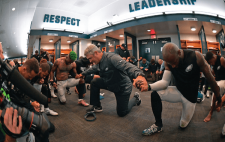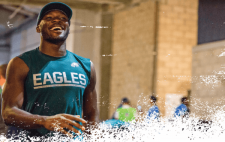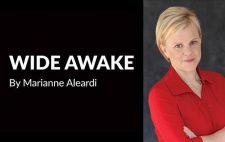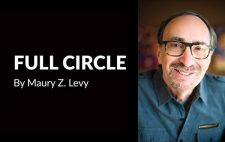Photos by David Michael Howarth
Ric and Jean Edelman – who recently announced a $25 million donation to the Rowan Fossil Park and whose name graces the university’s Edelman Planetarium – sat down for an interview with SJ Magazine’s Marianne Aleardi at the annual meeting of Rowan’s ACE Women’s Network. The audience heard how two young and penniless Rowan alumni built a financial firm that now manages $18.5 billion in assets. The pair, who have been married for 31 years, are strong believers in hard work, purpose and philanthropy, which was evident throughout the easy-going conversation.
On their lives when they started the company…
Jean: We were newly married, and we were extremely poor. We lived in a one-bedroom apartment. We had no TV. We didn’t get the newspaper. We didn’t go to the movies.
Ric: No furniture.
Jean: But we had a goal. We had a focus. We felt we really had a job to do.
At that time, in the ’80s, there were very few financial planners, but Ric actually ended up finding one, and we went to see him. He told us to lie on our mortgage application – that’s fraud! So we looked at each other and said we had to do this better.
Ric: It made us realize if this guy can make a living giving bad advice, we should probably be able to make a living giving good advice. So we decided to teach ourselves how personal finance works and then share with others what we learned. That was the basis of the firm in 1986.
On how much they worked then, and now…
Jean: When we began, we worked all the time. I mean, we had to get a dog so Ric would come home. We would go in the office in the morning and have breakfast, lunch and dinner there.
Ric: But last year, we brought in a CEO to replace me. That made life dramatically different. I’m no longer involved in the day-to-day operation of the business, allowing me to focus exclusively on financial education and our philanthropy. We’re working on a solution for social security, working with a big think tank in D.C., and we’re also trying to cure Alzheimer’s. So life has gotten a lot easier in one regard. We’re able to relax a little bit for the first time, which is…
Jean: …nice. We had some travel this year, which we don’t usually get to do.
 On the moment they first felt successful…
On the moment they first felt successful…
Jean: For me, I always felt like when there was a little bit more money in the bank account than the bills that month, that felt good.
Ric: Inc. Magazine runs an annual list of the 500 fastest growing companies in America that are privately owned. And we made the list in ’92, ’93, something like that. We were ranked number 69. That was shocking to us. We were just hunkered down, doing our thing every day. We had no idea that what we were doing made us the 69th fastest growing privately owned company in America…
Jean: …or that anybody was watching.
Ric: Yeah, it was really shocking.
Jean: The fact that somebody was paying attention was kind of bizarre.
Ric: That’s the first time I thought something was happening here that we weren’t realizing.
On the changes technology is sparking…
Ric: Half of all the jobs in America will be gone within 15 years, due to robotics and artificial intelligence. This is not the first time we’ve experienced this. Go back to the agricultural era; half of all America worked on a farm in the 1800s. Then we had the migration from the farm to the factory. Then we went from the factory to the office. The difference between now and then is that the change was a generational change. It took 40 years for that to happen. This time, it’s going to happen in a decade, forcing people to adapt to change really, really fast.
So how do you adapt to this? There are two ways: One is to focus on what matters. At our firm, we’re paperless. Getting our staff to stop using paper and rely on the digital copy was really difficult. We asked, “What is it we do for our clients?” We serve their best interests. Is that changing? No. So the fact that you are or are not dealing with a piece of paper is irrelevant. Why are we here? What matters? That hasn’t changed.
The second element is to identify if your occupation is at risk because of robotics and artificial intelligence. The sooner you figure out the answer to that question, the longer lead time you have to deal with it. Those who are better at adapting than others will be more successful.
On philanthropy…
Jean: Even when we were in our one-bedroom apartment with no furniture, we knew there was somebody worse off than us, so we always felt we had to help. Even when we didn’t have any money, we scraped $10 to give.
Ric: We hope everyone is inspired to give, if not money, then time. Volunteerism is at least as important as writing checks. We hope to be motivational and inspirational.
 On their donations to the Edelman Planetarium and Rowan Fossil Park…
On their donations to the Edelman Planetarium and Rowan Fossil Park…
Ric: If we’re going to remain the world leader, we have to remain cutting-edge in science and technology. We’re not producing enough kids engaged in science, technology, math and engineering. The two best sciences to engage children are paleontology and astronomy. Every kid loves dinosaurs. And if you let kids look through a telescope and see the rings of Saturn and moons of Jupiter, you’ll hook them. That’s how we’ll get kids excited about science and technology and math. The ability to make an impact is unprecedented.
It also has another piece that we really believe strongly in: supporting those who have made us who we are. Our debt to Rowan is hard to repay.
On their effort to cure Alzheimer’s…
Ric: Alzheimer’s will affect one out of two people at age 90, so odds are you will either have Alzheimer’s or you will be caring for someone who does. It’s an extraordinarily expensive disease. There’s no treatment, and there is no cure. There is no vaccine. We see our clients experiencing this with their parents, and themselves as they age. It’s a leading cause of poverty among the elderly; the over-65 age group is the fastest growing age group for filing bankruptcy because of long-term care.
And the typical Alzheimer’s patient lasts 12 years with the disease. It’s just very destructive on the family, because most of the caregivers are family members. They give up their own careers. They spend their own money on care. It’s devastating. It’s the No. 1 health issue in the world. And so we have been working for the past five years with Ken Dychtwald, who is the nation’s leading gerontologist and expert on aging. We’ve been working with him to figure out a solution to tackle this disease. Just last month, we won the visionary contest at XPRISE to be their next major program. We’ve offered to give them $25 million to create a diagnosis, treatment, cure and vaccine for Alzheimer’s over the next five years.
A future without a cure is too devastating to consider. It will bankrupt the country. If you have 50 percent of everybody over the age of 80 with this disease, and you have a third of the population over 80, it will bankrupt the nation. We have no choice but to cure it.
On the personal impact of giving…
Ric: The impact you need to make is on yourself. For most people, that doesn’t happen. They give money, but it didn’t prevent them from buying a café latte that day. It didn’t prevent them from buying a sweater or going out to dinner.
When you’re at a restaurant and thinking of ordering dessert, say to yourself, “Instead of spending $6 on dessert, I’m going to give the six bucks to someone. I’m going to impact my life through a sacrifice for the benefit of someone else. That’s when you know you’re giving enough: when you’re denying yourself something you otherwise would have or do in order to be of benefit or value of someone else. So just ask that question: What have you sacrificed? What have you given up?


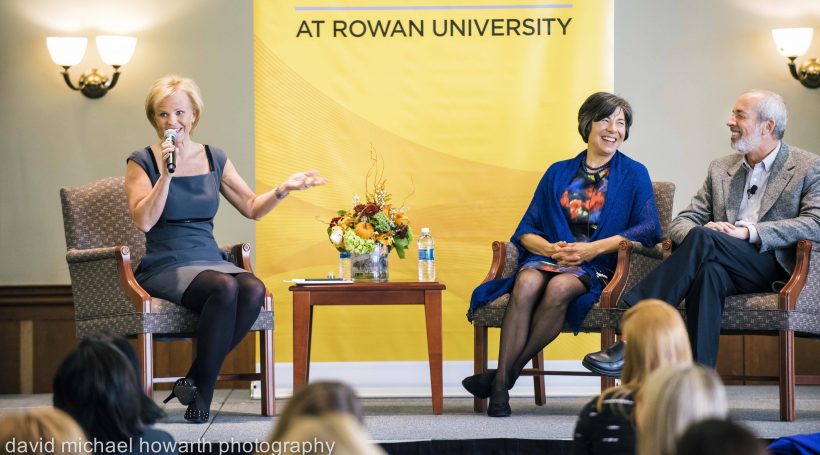
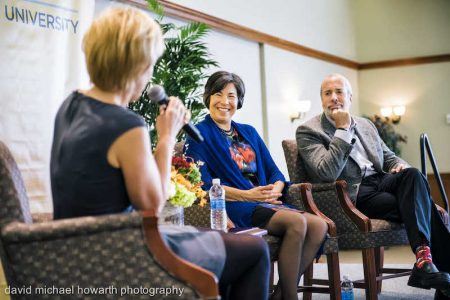 On the moment they first felt successful…
On the moment they first felt successful…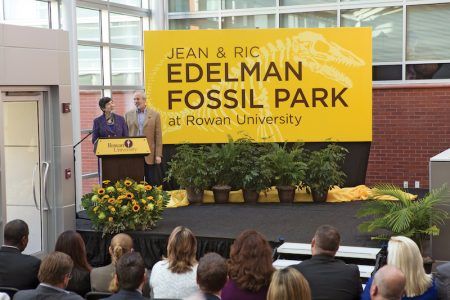 On their donations to the Edelman Planetarium and Rowan Fossil Park…
On their donations to the Edelman Planetarium and Rowan Fossil Park…